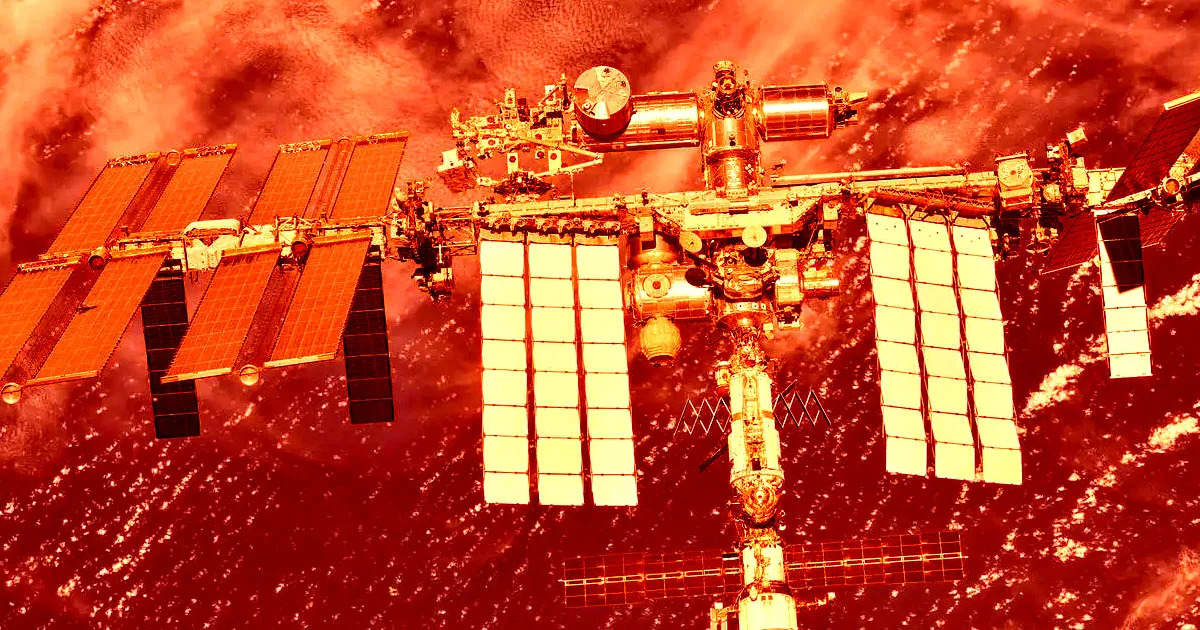Victor Tangermann
Fri, November 24, 2023

Totaled Recall
The International Space Station has been continuously hosting astronauts for 23 long years now — and its age is really starting to show, including in the form of cracks and leaks.
Now, NASA is discussing how best to dispose of the station in the early 2030s. And the price tag of the plan is staggering.
As Scientific American reports, the space agency estimates that it'll likely cost almost $1 billion to safely decommission the ISS, inducing it to harmlessly burn up in the Earth's atmosphere. That price is likely inflated due to the agency's refusal to use Russian vehicles, per the report, a complicating factor given the station's reliance on these craft.
The plan will also mark the end of decades of peaceful scientific cooperation in our planet's orbit, a symbol of international unity, especially when it comes to US-Russia relations.
"In terms of civilian cooperation, I think many would describe it as the biggest project ever embarked upon in human history," Mai’a Cross, a political scientist at Northeastern University, told SciAm.
ISS Inferno
Broadly speaking, there are two options to get the ISS out of orbit. Engineers could either simply have the station plummet uncontrollably towards the Earth's atmosphere — or they could orchestrate a more careful descent, using a special spacecraft to point it in the right direction.
In the case of the former, there's a risk of giant pieces of space station striking populated areas back on the ground.
"An uncontrolled reentry could significantly impact people on the ground, including fatalities, injuries and significant property damage," George Nield, president of the company Commercial Space Technologies, told SciAm.
Either way, scientists now have the task of minimizing the amount of debris that could fall on people down below, which is far easier said than done since the station orbits the entire planet every 90 minutes.
Ideally, it should stay pointed in the right direction as it's burning up in the atmosphere, which is made even harder by the uneven and unpredictable thickness of the Earth's protective layer.
As a result, NASA will have to develop and construct a custom-built vehicle that's powerful enough to deorbit and also accompany the station as it makes its descent.
Even with the help of Russia's Progress vehicles, it still would be a "challenge," Nield told SciAm, but given worsening US-Russia relations, even that option isn't on the table.
But if there's one certainty, it's that the ISS will go out with a bang, a bright inferno in the sky marking the bittersweet end to decades of international cooperation and scientific breakthroughs.

The International Space Station is celebrating its 25th year in orbit this week, but its time is running out. NASA says the station will need to be decommissioned by 2030, and the race is on to figure out what’s next.
'Sad to see it go': NASA planning to decommission, replace ISS by 2030
Esther Bower
Fri, November 24, 2023
TITUSVILLE, Fla. - The International Space Station is celebrating its 25th year in orbit this week, but its time is running out.
NASA says the station will need to be decommissioned by 2030, and the race is on to figure out what’s next.
For 25 years, the floating lab has been a space for science and a home for hundreds of astronauts.
"I never would have imagined what it would accomplish, so certainly it will be sad to see it go," said Dr. Don Platt who runs the Spaceport Education Center at Florida Tech.
Decades ago, Platt helped build parts of the 356-foot-wide laboratory, and NASA is ready for something new by the next decade.
"We’re six years away from it right now. That time is going to go real fast. We should almost be bending metal to build those new parts right now," said Dr. Ken Kremer who’s a researcher and space journalist who says he supports the transition but is worried about the rapidly approaching deadline.
Kremer says he’s concerned the United States could lose its presence in space if there isn’t a plan in place to replace the ISS soon.
"If these commercial space stations don’t come online in 2030, it will be the end of our earth presence in low earth orbit," Kremer added.
Other space experts are optimistic that replacing the ISS will open even more doors for private companies.
"There’s so many companies that are poised to occupy this void for commercial space, just on the horizon," said Mark Marquette who’s the community liaison for the American Space Museum in Titusville.
Marquette says space is on the verge of an economic explosion, with space tourism and manufacturing moving off the earth and above our heads.
"There will be ones for science, pharmacies will put them up, factories," Marquette concluded.
NASA is estimating the de-orbit process to cost around $1 billion to bring the space station back to Earth. It will have to be broken apart into smaller segments before it falls and burns up in the atmosphere.
No comments:
Post a Comment